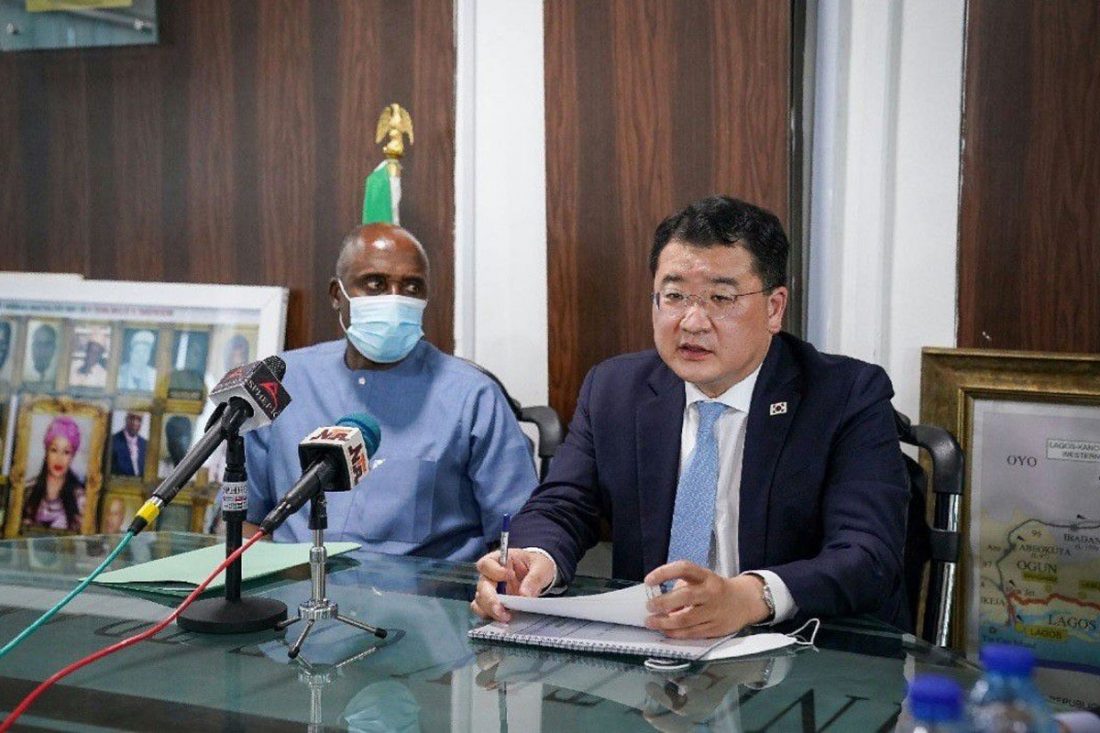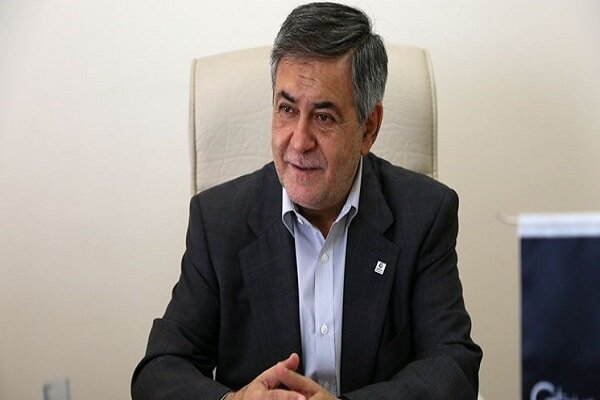South Korean Minister moves to boost trade with Nigeria
 ]
]
Troubled by the dwindling trade between Nigeria and South Korea, the South Korean First Vice Foreign Minister, Choi Jong-gun has visited Nigeria and held high-level meetings with senior Nigerian ministers.
Foreign Minister Choi Jong-gun visited Nigeria on his last visit to three African countries – Morocco, Senegal, and Nigeria between August the 14th and 19th this year. This visit was the first visit of the Korean Vice Minister in West Africa.
In a series of engagements with the Minister of Defence, Major Geneneral Bashir Magashi (rtd); Minister of Transportation, Rotimi Chibuike Amaechi and the Minister of State for Foreign Affairs, Ambassador Zubairu Dada, a meeting was organised and held on the 19th of August 2021.
The discussions focused on ways to develop bilateral relations, including cooperation on maritime security in the Gulf of Guinea.
The two sides agreed to further expand economic cooperation while agreeing that there is a great potential for cooperation between Korea, which has technological prowess, and Nigeria, which has population and resources.
During the talk sessions, both sides agreed the need to reorganise all agreements, such as the double taxation prevention agreement and the revision of the investment protection agreement, under the common recognition that it is important to prepare an institutional basis for expanding economic cooperation.
The Korean official emphasised the need to conduct business in a friendly environment by resolving the difficulties faced by Korean companies that have invested in Nigeria. The Ministry of Transport pledged to resolve the outstanding issues in order to fundamentally resolve the problem faced by Korean companies operating in Nigeria.
Despite the huge investments made into the country over the past decades, Nigeria is yet to benefit from the global conglomerate’s skills and technology transfer as well as the foreign investor’s huge investment potentials. This is because the government has yet to give them the necessary incentives and support even though these types of companies are already in the country.
The issues faced by foreign investors in Nigeria is not just limited to Korean companies. For instance, Africa’s biggest grocery retailer and South African-owned chain of stores, Shoprite, announced its exit from Nigeria after 15 years of operation.
Nigeria’s Minister of Industry, Trade and Investment, Otunba Niyi Adebayo, in April had lamented that the trade between both countries had slumped by 74 per cent from $5 million in 2018 to $1.3 million in 2019.
Adebayo, who spoke when he received the South Korean Ambassador to Nigeria, Kim Young-Chae, in his office, had noted that both countries shared strong economic and investment ties with over 20 Korean companies, including Samsung Heavy Industries and Hyundai Heavy Industries, presently operating in the country.
One notable mention at the meeting was Samsung Heavy Industries Nigeria who have been involved in a protracted dispute with its local partner.
With the visit of the South Korean First Vice Foreign Minister to Nigeria, it is expected that the Nigerian government will address the challenges facing the South Korean companies operating in Nigeria.
Samsung Heavy Industries (SHI) is one of the global conglomerates and reputable investors from South Korea that has established a strong presence in Nigeria. SHI established its subsidiary, Samsung Heavy Industries Nigeria Limited (SHIN) 10 years ago and made an investment of over $300 million dollars in Nigeria to construct West Africa’s most advanced fabrication and integration yard.
The company has made tremendous contributions to the Nigerian economy since its establishment and has contributed significantly in creating jobs while helping Nigerians acquire skills and opening up the Nigerian economy.
Through Egina project, Samsung Heavy Industries Nigeria employed over 3,000 Nigerians and spent 560,000 man-hours training locals with no prior experience in the shipbuilding and welding industry. It is widely known that over $1.6 billion in economic contributions was made through the project.
The past 10 years has not been a smooth sail for SHIN though as the company is not insulated from the challenges in the Nigerian operating environment. Despite the challenges facing its operations, SHIN has remained undaunted due to its faith in Nigeria and its long-term commitment to the country.
Commendably, the Nigerian Ports Authority (NPA) had granted a direct lease to SHIN for the SHI-MCI yard in Tarkwa Bay Lagos, following an investigation by NPA which concluded that its local partner had infringed contractual obligations resulting to the revocation of their Lease with NPA.
Currently, the Lagos High Courts have upheld this decision and it would be pivotal for the Federal Government to respect these judgements in order to give confidence to foreign investors.
The decision of NPA was not just for the protection of the foreign investors to enable their long-term stable operation, but is essential for Nigeria and its economy.
To ensure Nigeria benefits the most from the presence of the foreign investors through industry training and skill transfer, the Federal Government should, also in return, provide the enabling environment for the investors by guaranteeing the protection of the investments and operations in the country for at least 20-30 years.
This will enable Nigeria to take a big leap forward in technological advancement and social development.
During the meeting, both sides also agreed to hold the sixth Korea-Nigeria Joint Committee in Korea in the near future to discuss issues of common interest.
In addition, both sides also decided to continue high-level exchanges by taking advantage of opportunities such as the UN Peacekeeping Ministers’ Meeting to be held in Seoul in December 2021, and the Korea-Africa Forum.
In view of the peculiar challenges facing Samsung Heavy Industries Nigeria in its operational base in Lagos, which has become protracted, the company needs urgent support from the Federal Government agencies. The Federal Government and Ministry of Transport should endeavour to make the necessary efforts to protect the Foreign investor and restore confidence to the Korean Government.
With the visit of the South Korean First Vice Foreign Minister to Nigeria, it is expected that the Nigerian government will address the challenges facing the South Korean companies operating in the region. Industry experts and stakeholders will be hoping for swift actions from the Government to implement these protectionist measures in order to fast track beneficiaries to the Nation.
Read next: Nigerian waterways’ safety improved through SHIN and NIWA’s strategic alliance
S Korea trying to unfreeze Iranian blocked assets: Official
 ]
]
Hossein Tanhaei Chairman of Iran-South Korea Joint Chamber of Commerce broke the news on Sun. in an interview with FNA and restated that South Korea is trying to free Iranian assets blocked in South Korean banks because of US sanctions imposed against the country.
Turning to the return of two South Korean giants i.e. SAMSUNG and LG electronics companies to Iran, Tanhaei turned down the news spread on the return of the two South Korean companies to the Islamic Republic of Iran which left the country a couple of years ago as a result of US sanctions imposed against Iran.
During a phone contact between officials of Iranian Ministry of Foreign Affairs and South Korean ambassador to the Islamic Republic of Iran, it became clear that news of return of two South Korean home appliance manufacturing companies to Iran is ‘sheer lie’.
Elsewhere in his remarks, chairman of Iran-South Korea Joint Chamber of Commerce pointed to Iran’s $7 billion worth of assets blocked in South Korea and stated that South Korean officials are in direct talks with US officials for releasing Iranian blocked assets by lifting some sanctions imposed against Iran exceptionally.
Firstly, Islamic Republic of Iran wants its assets to return to the country in cash but if this issue was not realized, Iran would import raw materials, equipment and machinery from South Korea out of its financial resources blocked in South Korea, Tanhaei added.
MA/FNA14000614000626
Can BTS Make the Samsung Galaxy Z Flip a Must-Have Phone?
 ]
]
Samsung’s new Galaxy Z Flip 3 is the company’s most definitively fashion-oriented phone. It looks cool on screen, and feels even cooler when you’re holding it in your hand. Seeking that elusive it factor, Samsung took its collaboration with pop group BTS to a new level in 2021.
BTS has been Samsung ambassadors since 2020. This year, though, Samsung got BTS member SUGA to remix its theme tune, “Over the Horizon.” I can’t emphasize how much OTH is attached to Samsung’s identity; it’s been the company’s theme since 2011 and it’s the default ringtone on all Samsung smartphones.
While there have been plenty of other Samsung musical partnerships over the years, including other remixes of “Over the Horizon” (and personally, I’ll never forget 2007’s Beyonce Phone), the BTS “ARMY” are a rare cultural phenomenon. They’re passionately coherent and organized in the way many fandoms aren’t. So the ability to have a SUGA version of your phone’s theme tune —as well as the implied promise of more exclusive BTS content in the future—could push phones in a way that, say, Robert Downey Jr failed to do for HTC.
Especially in the US, no level of marketing dollar has been able to pry iPhones out of celebrities’ hands, or reduce the stigma of “green bubbles” among well-off youth. (On iMessage, texts from Android phones appear in green.) We’ve seen a lot of celebrity promoters briefly wave around a phone at an event, and then sit down and send out their own tweets “posted by Twitter from iPhone.” It happens over and over again.
BTS, on the other hand, are from Korea, where Samsung has a much more powerful (and patriotic) cultural profile and Apple is a foreigner. While the pop group’s fans are global, it’s possible that the stars themselves may feel more of a connection to Samsung than to Apple.
The relationship between BTS and its fans is an intense thing. I tweeted jokingly about how the remix means that Samsung has now hit the big time in Korea, and the tweet got more than 158,000 impressions in two hours. I am not that big a deal. The BTS ARMY is.
So I posed the question: would this get them to put their money where their love is?
And the answer is—it looks like there’s a chance. To listen to the fans, they trust that BTS have a real connection with Samsung.
I’m a phone analyst, with a specialty in 5G, who doesn’t know much about K-pop. But this seems like the ultimate test of a celebrity endorsement. I’ll be curious to see if the ARMY mobilizes to make Z Flip sales flip out.